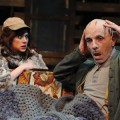Beginning Feb. 15, San Jose Stage Company takes on Sam Shepard’s Pulitzer Prize—winning Buried Child. Written during the economic slump of the 1970s, the semiautobiographical play explores the decay of the American Dream through the eyes of a struggling rural farm family. Within this household teetering on the brink of self-destruction, notions regarding family, identity and morality converge to form a macabre yet compelling narrative that director Kenneth Kelleher considers a timeless story for all.
Buried Child begins with Vince bringing his girlfriend home to meet his family for the first time. While initially the farm seems to embody the idyllic midwestern backcountry, the members of the family quickly dispel the façade. Vince’s grandparents are deranged alcoholics, his father is emotionally absent, and his uncle is an embittered amputee. When their darkest secret slowly begins to surface, it threatens to either snap the tenuous threads holding the family together, or offer a chance at salvation.
“It’s a very personal and also highly theatrical story,” notes Kelleher, a long-time Shepard fan, in reference to the playwright’s real-life influences.
Shepard’s grandfather owned a farm similar to the one depicted in the play, and his father constantly battled with alcoholism. The character of Vince’s uncle was likewise inspired by one of Shepard’s relatives, who had a false leg from a childhood accident. But despite these similarities between reality and fiction, the key to Buried Child ís lasting appeal is Shepard’s ability to richly layer themes and symbols.
“The theme is about spiritual and moral decay,” says Kelleher. “It’s a mythic story about a family about to erode.”
Citing the play’s powerful over-arching premise, the director saw no reason to update it or attempt to bring it into the present day. The production stays true to Shepard’s vision and to his last and most recent revision to the work, in 1997. On the one hand, the economic depression and questioning of family values is undoubtedly quite pertinent to today, but at the same time Shepard’s skills transform the play into a classic.
“From Sophocles to Shakespeare,” observes Kelleher about major playwrights, “they all investigate this issue and condition. Family and identity … the bonds that keep family together and destroy them at the same time.”
If Buried Child seems overly grim, rest assured that Kelleher sought to balance out the play’s bleak undertones with lighter moments. At heart the text is not just about adversity but rather a gripping “mixture of comic and tragic elements.”
Buried Child
Runs Feb. 15—March 11 at the Stage in San Jose

 Review: La Lune Sucree
Review: La Lune Sucree  SJ Q&A: Randy King, San Jose Stage Company
SJ Q&A: Randy King, San Jose Stage Company 


